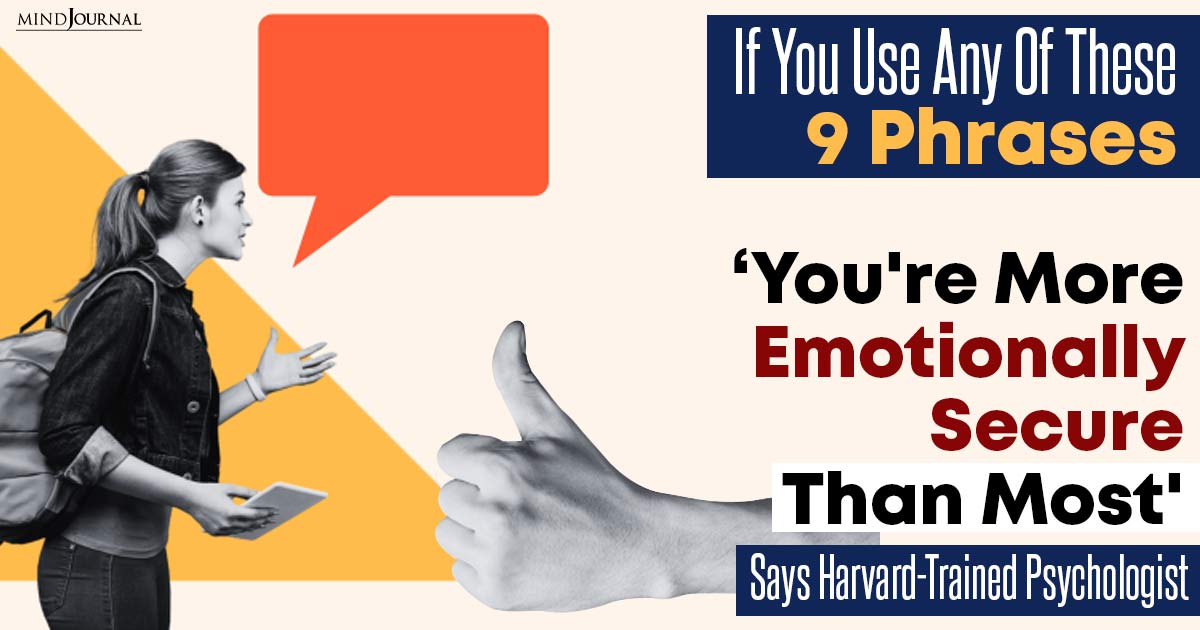Emotionally secure people possess a unique sense of empowerment, confidence, and self-acceptance. They navigate the world with authenticity and unwavering conviction, prioritizing actions that hold personal meaning.
Backed by research from Harvard-trained psychologist, Dr. Cortney S. Warren, Ph.D, mentions that such people are equipped with self-assurance and have the ability to embrace vulnerability. Importantly, their strength lies in not seeking validation from external sources.
However, achieving such emotional security requires considerable effort and dedication. According to CNBC, by incorporating any of the following nine phrases into your communication, you’re more emotionally secure than most people.
Related: 6 Ways Parents Can Build Emotional Intelligence And Resilience In Kids
9 Phrases Emotionally Secure People Use, According To Expert
1. “Let me think about it before I answer.”
One of the most noticeable signs of an emotionally secure person is that they articulate themselves well. They exhibit a thoughtful approach, carefully selecting their words and avoiding impulsive reactions.
Phrases that reflect emotional security:
“I feel quite frustrated at present, and think it would be better for me to have some personal time. I want to make sure I say something that I may regret later.”
“At this moment, I don’t have a response. Can we please come back to this conversation tomorrow?”
2. “No.”
An emotionally secure person feels comfortable establishing boundaries. They confidently define their limits, guided by their own moral principles, needs, and desires.
Similar phrases:
“I apologize, but I’m unable to assist with that since I already have a significant number of commitments.”
“I appreciate the offer, but it’s not something that brings me joy.”
3. “I’m not comfortable with that.”
Emotionally secure individuals consistently express their needs with respect. They openly communicate their feelings when subjected to mistreatment and take necessary action if their boundaries are violated.
Similar phrases:
“When you say such things, it really hurts me.”
“If you continue to treat me in this manner, I will distance myself from you to safeguard my well-being.”
4. “This is who I am, and I’m proud of it.”
Emotionally secure individuals possess unwavering self-acceptance and proudly embrace their authentic selves without seeking validation or approval from others. Make it easier for friends and loved ones to trust and feel secure in their presence.
Phrases that show emotional security includes:
“I embrace my flaws and confidently express my true self, and I take great pride in doing so.”
“I may not be liked by everyone, but I’m comfortable and at peace with myself.”
5. “Am I like that?”
An emotionally secure person possesses the remarkable ability to handle criticism without reacting defensively. When confronted with negative feedback, they refrain from taking it personally and instead, view it as a valuable chance for personal growth.
Related: 13 Signs Of Emotional Intelligence And Friendship
Phrases that show emotional security include:
“I wasn’t aware that I acted like this. I appreciate you bringing it to my attention.”
“It’s eye-opening for me to realize that I use such words. Thank you for pointing it out.”
6. “I’ll work on that.”
Within meaningful relationships, emotionally secure individuals recognize the importance of adaptability. They understand that personal growth and the enhancement of connections stem from taking proactive measures.
Similar phrases:
“I value your concerns and am actively working on being more compassionate in our conversations.”
“I’m aware of my impatience and actively striving to be more patient and less pushy.”
7. “I’m sorry you’re struggling. Is there any way I can help?”
Emotionally secure people excel in providing unwavering support, driven by their empathetic and non-judgmental nature. They grasp the vital truth that a person’s bad day is not a reflection of their own worth.
Similar phrases:
“You seem sad, and I’m here to lend a hand.”
“I can tell this is challenging for you, but rest assured, you have my support.”
8. “This matters to me.”
A strong belief system plays a pivotal role in the choices and actions of emotionally secure people who confidently uphold their values and principles, enabling them to take a firm stand when faced with situations that violate their beliefs.
Similar phrases:
“I deeply care about this, regardless of whether it resonates with you or not.”
“I cannot support something that is wrong and goes against what I believe in.”
9. “I will try!”
Emotionally secure individuals have nurtured a profound sense of inner safety, assuring themselves that they will be resilient even in the face of potential failures.
This liberates them to explore and experiment with new endeavors, be it hobbies, friendships, travels, or personal coping strategies.
Similar phrases:
“Next time, I’ll give it a try!”
“I may not be good at it, but I’m in for the challenge!”
Related: 12 Warning Signs Someone Is Emotionally Unstable
Do you possess emotional stability or do you experience emotional insecurity? Which of these phrases do you employ regularly? Please feel free to express your thoughts in the comments section!









Leave a Reply
You must be logged in to post a comment.